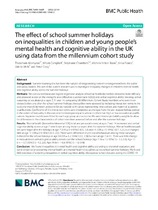| dc.contributor.author | Kromydas, Theocharis | |
| dc.contributor.author | Campbell, Mhairi | |
| dc.contributor.author | Chambers, Stephanie | |
| dc.date.accessioned | 2022-02-03T09:56:55Z | |
| dc.date.available | 2022-02-03T09:56:55Z | |
| dc.date.issued | 2022 | |
| dc.identifier.citation | Kromydas, T., Campbell, M., Chambers, S., Boon, M. H., Pearce, A., Wells, V., & Craig, P. (2022). The effect of school summer holidays on inequalities in children and young people’s mental health and cognitive ability in the UK using data from the millennium cohort study. BMC Public Health, 22(1) doi:10.1186/s12889-022-12540-2 | en_US |
| dc.identifier.uri | doi.org/10.1186/s12889-022-12540-2 | |
| dc.identifier.uri | http://hdl.handle.net/10566/7145 | |
| dc.description.abstract | Background: Summer learning loss has been the subject of longstanding concern among researchers, the public
and policy makers. The aim of the current research was to investigate inequality changes in children’s mental health
and cognitive ability across the summer holidays.
Methods: We conducted linear and logistic regression analysis of mental health (borderline-abnormal total difculty
and prosocial scores on the strengths and difculties questionnaire (SDQ)) and verbal cognitive ability (reading, verbal
reasoning or vocabulary) at ages 7, 11 and 14, comparing UK Millennium Cohort Study members who were interviewed before and after the school summer holidays. Inequalities were assessed by including interaction terms in the
outcome models between a discrete binary variable with values representing time periods and maternal academic
qualifcations. Coefcients of the interaction terms were interpreted as changes from the pre- to post-holiday period
in the extent of inequality in the outcome between participants whose mothers had high or low educational qualifcations. Separate models were ftted for each age group and outcome. We used inverse probability weights to allow
for diferences in the characteristics of cohort members assessed before and after the summer holidays.
Results: Mental health (borderline/abnormal SDQ total and prosocial scores) at ages 7 and 14 worsened and verbal
cognitive ability scores at age 7 were lower among those surveyed after the summer holidays. Mental health inequalities were larger after the holidays at age 7 ([OR=1.4; 95%CI (0.6, 3.2) and 14: [OR=1.5; 95%CI (0.7, 3.2)], but changed
little at age 11 (OR=0.9; 95%CI (0.4, 2.6)]. There were diferences in pro-social behaviours among those surveyed
before/after the school holidays at age 14 [OR=1.2; 95%CI (0.5, 3.5)] but not at age 7 or 11. There was little change
in inequalities in verbal cognitive ability scores over the school holidays [Age 7: b=1.3; 95%CI (−3.3, 6.0); Age 11:
b=−0.7; 95%CI (−4.3, 2.8); Age 14: b=−0.3; 95%CI (−1.0, 0.4)].
Conclusion: We found inequalities in mental health and cognitive ability according to maternal education, and
some evidence or worsening mental health and mental health inequalities across school summer holidays. We found
little evidence of widening inequalities in verbal cognitive ability. Widespread school closures during the COVID-19 | en_US |
| dc.language.iso | en | en |
| dc.publisher | BMC Public Health | en_US |
| dc.subject | COVID-19 | en_US |
| dc.subject | Mental health | en_US |
| dc.subject | Cognitive ability | en_US |
| dc.subject | School closures | en_US |
| dc.title | The effect of school summer holidays on inequalities in children and young people’s mental health and cognitive ability in the UK using data from the millennium cohort study | en_US |
| dc.type | Article | en_US |

